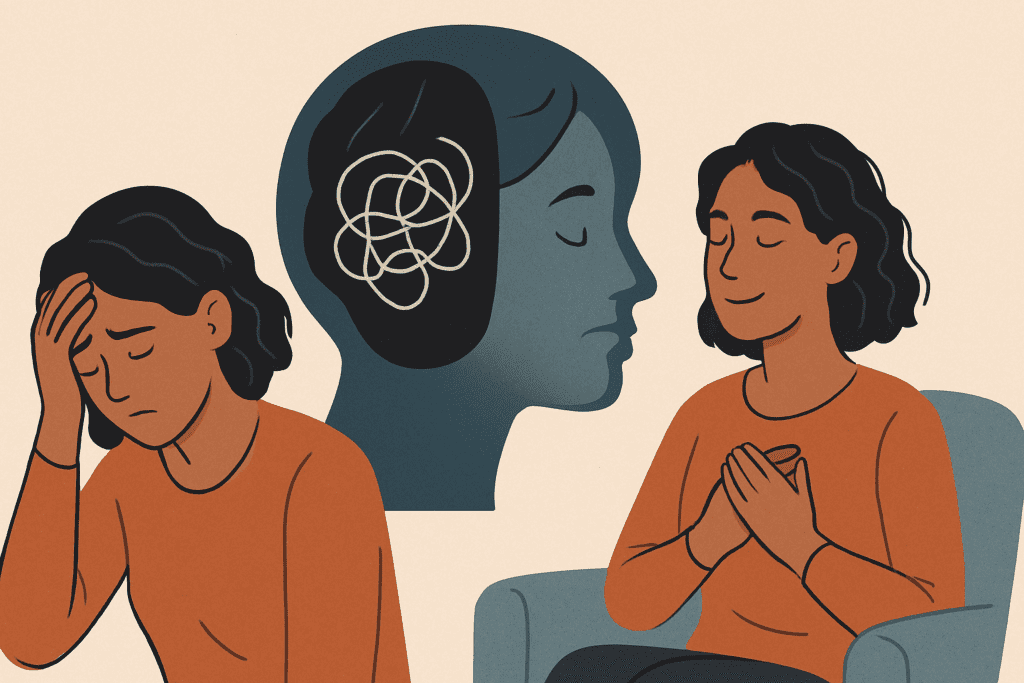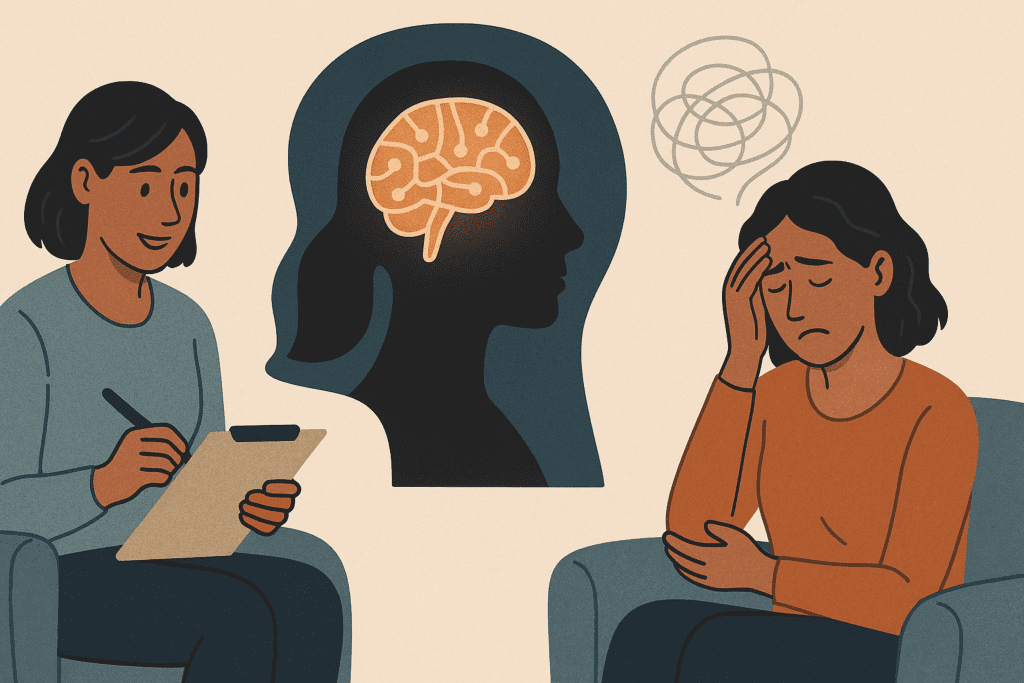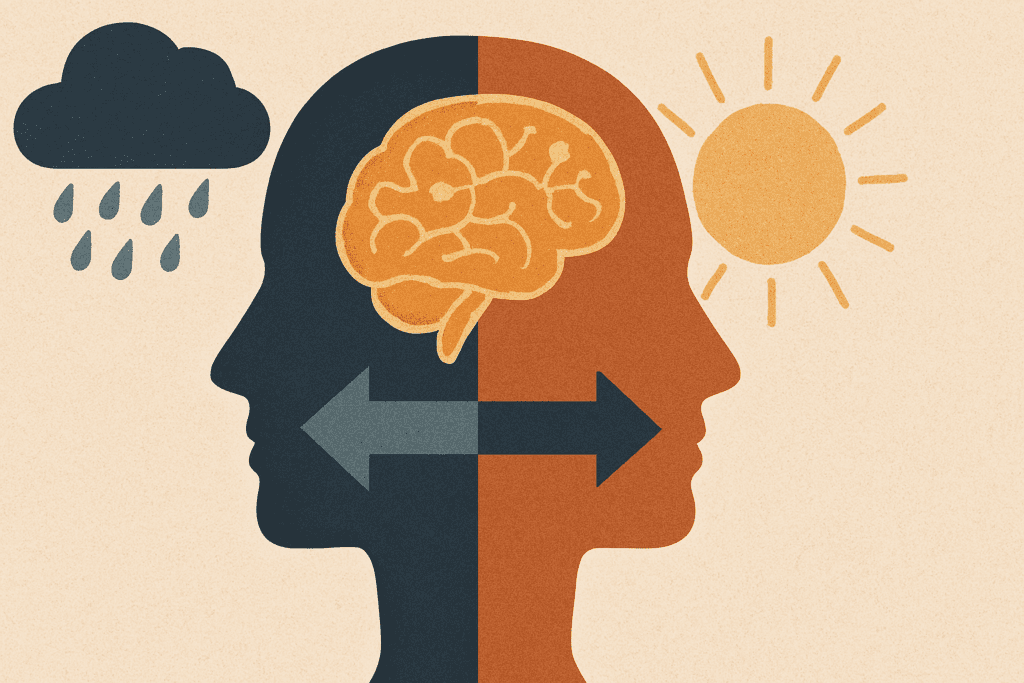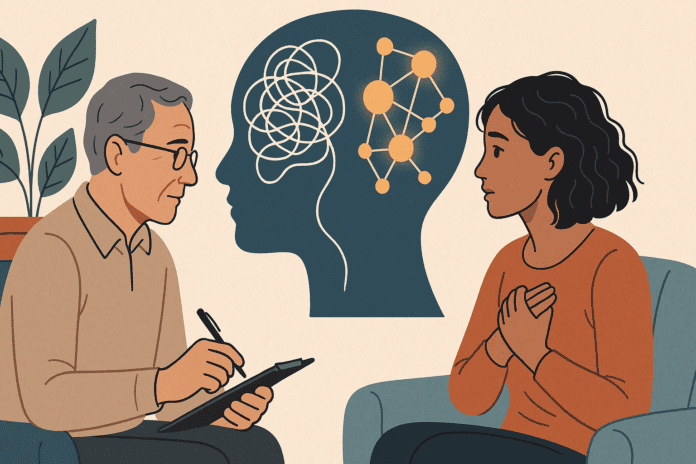Cognitive therapy for depression has emerged as one of the most effective, evidence-based strategies for treating depressive disorders by targeting the very root of emotional distress: our thoughts. Rather than merely suppressing symptoms or relying solely on pharmaceutical interventions, this form of behavioral treatment for depression empowers individuals to challenge and transform the negative thinking patterns that perpetuate emotional suffering. In recent years, the scientific community has made considerable progress in understanding how these maladaptive cognitive processes affect the brain and contribute to the onset and recurrence of depression. What has become increasingly clear is that cognitive therapy doesn’t just offer temporary relief—it can create lasting changes in brain function and mental resilience.
You may also like: How Does CBT Work to Improve Relationships and Communication? Science-Backed Techniques for Getting Along with Others
Understanding how cognitive therapy operates involves appreciating the relationship between thought patterns, emotions, and behavior. Depression often distorts one’s internal narrative, leading to persistent feelings of worthlessness, guilt, and hopelessness. These distorted beliefs are not merely side effects of the disorder but are integral to its persistence. Cognitive therapy aims to disrupt this cycle by teaching individuals to identify these harmful thought patterns, question their validity, and replace them with more balanced and realistic perspectives. This therapeutic approach, deeply rooted in empirical psychological research, has reshaped how clinicians conceptualize and address depression in both acute and chronic contexts.
By integrating techniques such as cognitive restructuring, behavioral activation, and mindfulness-based strategies, cognitive therapy for depression provides a comprehensive toolkit for long-term mental wellness. Patients are not simply told to “think positive” but are guided through a rigorous, structured process that helps them build cognitive flexibility, emotional regulation, and self-efficacy. Through repetition and reinforcement, these new thinking habits become ingrained, resulting in not just symptom reduction but true psychological transformation. Over time, the brain itself adapts, forming new neural pathways that support healthier emotional responses and more constructive coping mechanisms.
The neuroplasticity of the brain plays a central role in the effectiveness of cognitive therapy. Contrary to outdated beliefs that the adult brain is static, research in neuroscience has shown that the brain remains malleable throughout life. This adaptability means that with the right therapeutic interventions, individuals can “rewire” their brains, weakening the pathways associated with depressive thought patterns while strengthening those tied to resilience and optimism. This understanding underscores why cognitive therapy is not just a short-term fix but a method for achieving enduring change. In essence, cognitive therapy for depression helps individuals reclaim agency over their minds, fostering a renewed sense of purpose and emotional equilibrium.
The foundation of cognitive therapy lies in its structured, goal-oriented approach. Unlike some forms of talk therapy that focus primarily on exploration, cognitive therapy is highly interactive, involving active collaboration between therapist and patient. Sessions are typically organized around specific goals, such as identifying automatic negative thoughts, examining their accuracy, and developing alternative viewpoints. The process is not passive; patients are expected to engage in homework assignments that reinforce skills learned during therapy sessions. These exercises may include journaling, thought records, or behavioral experiments designed to test the validity of negative assumptions.
Over time, this approach cultivates an internal observer—a mental faculty that allows individuals to monitor their own thinking processes without immediately accepting them as truth. This metacognitive shift is crucial because it introduces a space between stimulus and response, enabling thoughtful evaluation rather than automatic emotional reactions. For individuals struggling with depression, this space can be the difference between spiraling into despair and choosing a more balanced perspective. The emphasis on practicality and self-monitoring makes cognitive therapy particularly effective as a behavioral treatment for depression, equipping patients with tools they can continue to use long after formal therapy ends.
A key component of cognitive therapy is its emphasis on evidence-based reasoning. Depressive thoughts often go unchallenged because they feel so convincing. Cognitive therapy encourages individuals to adopt a scientific attitude toward their own thinking, requiring them to gather evidence for and against their beliefs. For example, a patient who believes they are a failure might be asked to list specific instances that support or contradict this notion. This process not only weakens the grip of negative beliefs but also fosters a more nuanced and compassionate view of oneself. Importantly, this shift in thinking is not imposed by the therapist but discovered by the patient through guided self-exploration.
Behavioral experiments further enhance the efficacy of this approach. Patients are encouraged to test their assumptions in real-world situations, creating opportunities for disconfirmation. A person who fears social rejection, for instance, might be guided to initiate a conversation and then reflect on the outcome. Often, these experiments reveal that feared outcomes are less likely or less catastrophic than anticipated. As patients accumulate these corrective experiences, their confidence grows, and the emotional charge of previously distressing thoughts diminishes. The integration of cognitive and behavioral strategies thus creates a dynamic feedback loop that accelerates emotional healing and supports sustained improvement.
One of the most transformative aspects of cognitive therapy for depression is its ability to influence the brain at a structural level. Functional MRI studies have demonstrated that successful cognitive therapy is associated with changes in brain regions involved in emotion regulation, such as the prefrontal cortex and amygdala. These areas show altered patterns of activation following therapy, suggesting that the brain is literally reorganizing itself in response to new cognitive strategies. Such findings lend robust support to the idea that cognitive therapy does more than change minds—it changes brains. This neurobiological validation has helped cement cognitive therapy as a frontline intervention in modern mental health care.
Moreover, cognitive therapy aligns well with current understandings of depression as a multifaceted disorder involving biological, psychological, and social dimensions. Rather than treating depressive symptoms in isolation, cognitive therapy addresses the broader context of a person’s life, including their relationships, work, and self-concept. This holistic perspective is particularly valuable in cases of recurrent or treatment-resistant depression, where medication alone may be insufficient. By fostering self-awareness, resilience, and adaptive problem-solving, cognitive therapy enables individuals to build a more fulfilling and balanced life. This long-term approach is what distinguishes it as a behavioral treatment for depression with enduring benefits.
The therapeutic alliance also plays a crucial role in the success of cognitive therapy. While the techniques themselves are powerful, their effectiveness is amplified when delivered within a trusting, empathetic relationship. A skilled therapist creates a safe space where patients feel seen, heard, and supported. This emotional connection enhances engagement and motivation, making it more likely that patients will persist through the often challenging process of cognitive change. Research has consistently shown that the quality of the therapeutic relationship is a strong predictor of treatment outcomes, further emphasizing the human element of this scientifically grounded approach.
In addition to its clinical applications, cognitive therapy for depression has increasingly been adapted for use in group settings, digital platforms, and self-guided formats. These innovations have expanded access to care, particularly for individuals who face barriers such as geographic isolation, financial constraints, or stigma. Online programs and mobile apps now offer interactive modules based on cognitive therapy principles, allowing users to learn and practice skills at their own pace. While these formats may lack the depth of traditional one-on-one therapy, they represent an important step toward democratizing mental health care. As technology continues to evolve, hybrid models that combine digital tools with human support are likely to become more prevalent.
Another critical strength of cognitive therapy lies in its preventative potential. Because it equips individuals with strategies for identifying and countering negative thought patterns before they escalate, it can serve as a powerful tool for relapse prevention. Studies have shown that individuals who complete a course of cognitive therapy are less likely to experience future depressive episodes compared to those who receive medication alone. This enduring effect is partly due to the skill-based nature of the therapy, which emphasizes self-reliance and proactive coping. In essence, cognitive therapy teaches individuals how to become their own therapists, capable of navigating life’s challenges with greater resilience and insight.
Importantly, the benefits of cognitive therapy extend beyond the alleviation of depressive symptoms. Many patients report improvements in areas such as self-esteem, interpersonal relationships, and overall life satisfaction. These broader gains reflect the therapy’s focus on holistic well-being rather than symptom suppression alone. By helping individuals clarify their values, set meaningful goals, and cultivate a more compassionate inner dialogue, cognitive therapy fosters a sense of purpose and personal growth. This comprehensive impact makes it not only a treatment for depression but a foundation for long-term mental wellness.
It is also worth noting that cognitive therapy is compatible with other treatment modalities. It can be effectively integrated with medication, mindfulness practices, and other forms of psychotherapy to create a personalized treatment plan. For example, individuals who experience severe symptoms may benefit from an initial pharmacological intervention to stabilize mood, followed by cognitive therapy to address underlying cognitive distortions. This integrative approach allows for flexibility and responsiveness to individual needs, maximizing the likelihood of recovery and sustained wellness. Cognitive therapy’s adaptability and empirical grounding make it an invaluable component of any comprehensive mental health strategy.
Finally, the cultural adaptability of cognitive therapy enhances its relevance in our increasingly diverse society. With thoughtful modifications, cognitive therapy has been successfully applied across different cultural contexts, taking into account variations in language, values, and worldviews. This cultural sensitivity is essential for building trust and ensuring that therapeutic interventions are both respectful and effective. As awareness of mental health issues continues to grow globally, culturally attuned cognitive therapy will play a crucial role in meeting the needs of diverse populations. In this way, cognitive therapy for depression stands not only as a scientifically validated intervention but as a humanistic endeavor that honors the individuality of each person it serves.

Rewiring the Mind: Why Cognitive Therapy for Depression Offers Lasting Relief and Renewed Hope
In a world where mental health challenges are increasingly prevalent, the need for effective, sustainable treatment options has never been more urgent. Cognitive therapy for depression rises to meet this challenge by offering a path that is both scientifically grounded and deeply human. By targeting the cognitive distortions that fuel depressive symptoms and providing practical strategies for change, this form of behavioral treatment for depression offers more than symptom management—it facilitates genuine transformation. Through structured interventions, emotional support, and the remarkable plasticity of the human brain, cognitive therapy empowers individuals to take charge of their mental health and build lives rooted in resilience, purpose, and well-being.
As the field of mental health continues to evolve, cognitive therapy stands out for its versatility, effectiveness, and enduring impact. It respects the complexity of human suffering while providing a clear roadmap for healing. Whether delivered in person, online, or in group settings, its core principles remain the same: challenge unhelpful thoughts, test assumptions, and cultivate healthier ways of thinking and being. This approach not only alleviates current distress but also fortifies individuals against future episodes, making it a cornerstone of long-term mental wellness. In the end, cognitive therapy for depression reminds us that change is not only possible—it is achievable, sustainable, and profoundly life-affirming.
Embracing the Power of Cognitive Therapy for Depression: A Pathway to Lasting Mental Wellness
In the evolving landscape of mental health care, cognitive therapy for depression has emerged not merely as a short-term remedy, but as a profound catalyst for long-lasting psychological resilience and emotional clarity. Its power lies not in momentary relief, but in the gradual reengineering of thought patterns that once fed cycles of hopelessness and self-criticism. By addressing the distorted cognitive frameworks that often fuel depressive symptoms, cognitive therapy offers individuals a roadmap out of despair—one grounded in logic, self-compassion, and enduring behavioral change.
One of the most compelling aspects of this approach is its capacity to help individuals cultivate agency. Rather than feeling at the mercy of their moods or past experiences, patients learn how to become active participants in their mental health journey. Through guided exercises and structured reflection, they uncover the core beliefs that underlie their emotional suffering and begin to replace them with more constructive, reality-based alternatives. In doing so, they not only alleviate their immediate distress but also inoculate themselves against future relapses by developing a more adaptive, growth-oriented mindset.
Long-term success with cognitive therapy for depression often rests on how deeply these cognitive shifts become internalized. When patients begin to intuitively challenge automatic negative thoughts and replace them with balanced alternatives, the therapy transcends its clinical setting. It becomes a lifelong skill—a mental framework that supports healthier choices, improved relationships, and a more optimistic worldview. This is where the therapy proves its true value: not just as a behavioral treatment for depression, but as a lifelong cognitive tool for flourishing in an unpredictable world.

Frequently Asked Questions: Cognitive Therapy for Depression and Long-Term Mental Wellness
1. How does cognitive therapy for depression adapt to individual belief systems and cultural backgrounds?
Cognitive therapy for depression is most effective when tailored to each individual’s unique worldview. Therapists are trained to incorporate a client’s cultural norms, religious beliefs, and personal values into the therapeutic process without imposing a rigid framework. This personalized approach enhances engagement and ensures that the cognitive restructuring strategies resonate with the client’s lived experience. For example, someone from a collectivist culture might focus on interpersonal harmony rather than individual self-esteem, which subtly shifts how cognitive distortions are challenged. In this way, cognitive therapy for depression becomes not only a behavioral treatment for depression but also a culturally sensitive dialogue that respects and reflects personal identity.
2. Can behavioral treatment for depression be effectively delivered through virtual platforms or teletherapy?
Yes, the delivery of behavioral treatment for depression through teletherapy has shown strong clinical outcomes, especially when cognitive therapy methods are preserved with fidelity. Digital platforms now include interactive tools like thought records, mood trackers, and guided CBT modules that replicate the in-person experience. Cognitive therapy for depression delivered online also offers logistical advantages, such as increased accessibility for those in rural areas or with mobility challenges. Moreover, some patients report feeling safer and more open in their own homes, which may enhance emotional vulnerability and honest reflection. While some nuances of body language may be lost, the core elements of therapeutic connection and cognitive restructuring remain intact in virtual formats.
3. What role does language play in reinforcing or breaking depressive thinking patterns?
Language significantly shapes how we think and process emotions. Cognitive therapy for depression often involves scrutinizing the language clients use internally—especially catastrophizing, black-and-white thinking, and overgeneralizations. Changing habitual phrases like “I always fail” to “I had a setback this time” can shift emotional responses and behavioral outcomes. In behavioral treatment for depression, even subtle adjustments in self-talk can open the door to more flexible thinking and improved self-efficacy. Therapists often help clients become linguistically aware, recognizing that words are not just descriptive tools but active agents in shaping mental health outcomes.
4. How does behavioral treatment for depression differ when treating chronic depression compared to episodic depression?
Chronic depression often involves more ingrained cognitive distortions and behavioral avoidance patterns that require longer-term, layered interventions. Cognitive therapy for depression in these cases is more than symptom management—it becomes a deep excavation of core beliefs formed over years or even decades. In contrast, individuals with episodic depression may respond more quickly to cognitive restructuring and behavior activation strategies. Behavioral treatment for depression in chronic cases may also incorporate schema-focused work and emotional regulation skills to address long-standing maladaptive patterns. Therapists must carefully pace the therapy and balance cognitive work with emotional support to prevent overwhelm and disengagement.
5. Are there specific populations for whom cognitive therapy for depression may be less effective?
While cognitive therapy for depression is broadly applicable, certain populations may require modified or adjunctive approaches. Individuals with severe cognitive impairments, active psychosis, or profound developmental disabilities may struggle with the abstract reasoning skills needed for cognitive restructuring. However, when cognitive challenges are mild, therapists can adapt behavioral treatment for depression using simplified language, visual aids, and more concrete exercises. Additionally, people with strong emotional dysregulation or trauma histories may benefit from integrating emotion-focused or somatic therapies alongside CBT to help with emotional processing. The key is a flexible, client-centered framework rather than a one-size-fits-all protocol.
6. Can behavioral treatment for depression support patients in tapering off antidepressant medication?
Yes, when coordinated with medical professionals, behavioral treatment for depression can be a valuable support during the process of medication tapering. Cognitive therapy for depression equips individuals with tools to manage emerging symptoms, regulate emotions, and handle stress without pharmacological aid. Therapists often work closely with psychiatrists to time the reduction of medication with progress in therapy. It’s crucial to monitor for withdrawal symptoms or relapse indicators and to reinforce coping strategies during the vulnerable transition period. In some cases, behavioral treatment for depression may help individuals maintain wellness long-term without the need for ongoing medication.
7. How can cognitive therapy for depression influence physical health and somatic symptoms?
Depression frequently manifests in physical symptoms such as chronic fatigue, pain, and gastrointestinal discomfort. Cognitive therapy for depression can reduce these somatic symptoms by addressing the negative thought patterns and behavioral patterns that exacerbate them. For example, reducing catastrophizing around pain or fatigue can lower physiological stress responses, improve sleep quality, and enhance treatment adherence. Behavioral treatment for depression also encourages gradual re-engagement with physical activity, which directly supports cardiovascular, endocrine, and immune system health. Over time, individuals often report feeling more energized and physically capable as their mental state improves, demonstrating the interconnectedness of body and mind.
8. What innovations are emerging in the field of behavioral treatment for depression?
Recent innovations in behavioral treatment for depression include the integration of digital mental health apps, artificial intelligence–guided therapy assistants, and virtual reality for exposure-based interventions. Some cognitive therapy protocols now use real-time mood tracking and wearable biometric feedback to detect depressive patterns early and adapt interventions on the fly. Additionally, next-generation cognitive therapy for depression includes third-wave approaches such as mindfulness-based CBT and compassion-focused therapy, which emphasize acceptance, presence, and emotional warmth alongside traditional restructuring. These evolving tools not only make treatment more accessible but also allow for personalization that was once only possible in face-to-face therapy settings.
9. How does cognitive therapy for depression equip individuals to navigate social relationships more effectively?
Depression often distorts interpersonal perception, leading individuals to misinterpret neutral events as rejection or failure. Through cognitive therapy for depression, individuals learn to question these assumptions, improve communication skills, and build social confidence. Behavioral treatment for depression may include role-playing, social exposure tasks, and assertiveness training to help clients re-engage with their communities. As depressive symptoms diminish, many people report increased empathy, better boundary-setting, and a renewed ability to experience joy in connection. Relationships often shift from sources of stress to powerful protective factors that support ongoing recovery.
10. What are the long-term implications of completing a course of cognitive therapy for depression?
Completing cognitive therapy for depression often results in long-term cognitive shifts that persist well beyond the therapy itself. Clients frequently report being able to catch themselves mid-thought when old depressive patterns emerge and redirect their thinking toward more balanced interpretations. These skills function as internalized tools that enhance stress resilience, support decision-making, and improve self-trust over time. Behavioral treatment for depression also often results in more consistent routines, healthier lifestyle habits, and stronger emotional boundaries. The cumulative effect is not just recovery from depression, but a deepened sense of agency, identity, and hope for the future.

Importantly, this process does not demand perfection or immediate transformation. The effectiveness of cognitive therapy hinges on consistency, patience, and the therapeutic alliance built between clinician and client. With proper support, many individuals find that what begins as a structured intervention evolves into a deeply personal philosophy—one that shapes how they interpret adversity, interact with others, and nurture their internal dialogue.
Ultimately, the enduring impact of cognitive therapy for depression is not simply a reduction in symptoms, but the cultivation of a life rooted in clarity, purpose, and psychological strength. It invites individuals to move beyond survival and into self-actualization. For those willing to engage with its methods, cognitive therapy provides far more than temporary relief—it offers a sustainable path toward emotional freedom and holistic well-being. In an era where mental health challenges are increasingly prevalent, investing in this kind of evidence-based, empowering therapy may well be one of the most transformative decisions a person can make.
therapy for mood disorders, depression recovery strategies, mental wellness techniques, thought restructuring therapy, cognitive behavioral methods, psychological resilience building, emotional regulation skills, overcoming negative thinking, CBT for mental health, managing depressive thoughts, psychotherapy for emotional health, long-term depression relief, mood improvement therapy, cognitive distortions and depression, evidence-based mental health care, personalized mental health treatment, rewiring thought patterns, therapeutic tools for depression, neuroplasticity and mental health, talk therapy for depression
Further Reading:
Cognitive behaviour therapy (CBT) – Better Health Channel
Cognitive Restructuring: Techniques and Examples
Cognitive Behavior Therapy – StatPearls
Disclaimer
The information contained in this article is provided for general informational purposes only and is not intended to serve as medical, legal, or professional advice. While Health11News strives to present accurate, up-to-date, and reliable content, no warranty or guarantee, expressed or implied, is made regarding the completeness, accuracy, or adequacy of the information provided. Readers are strongly advised to seek the guidance of a qualified healthcare provider or other relevant professionals before acting on any information contained in this article. Health11News, its authors, editors, and contributors expressly disclaim any liability for any damages, losses, or consequences arising directly or indirectly from the use, interpretation, or reliance on any information presented herein. The views and opinions expressed in this article are those of the author(s) and do not necessarily reflect the official policies or positions of Health11News.


